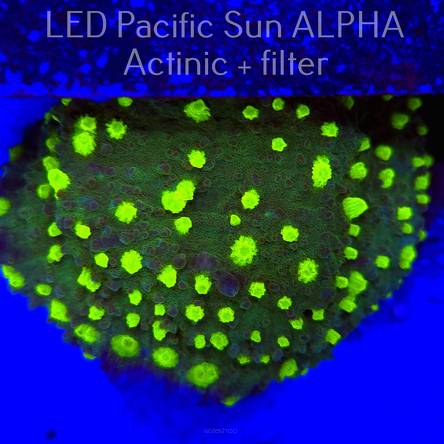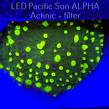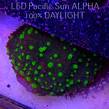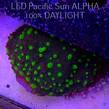C.D. Echinophyllia Hollywood Stunner Chalice 3cm
- Manufacturer: JadwigaMorska
-
Availability:
 Exists
(15 pcs.)
Exists
(15 pcs.)
- pcs.
- €17.11
Illustrative photo, coral without frag plug. The price is not subject to discount.
Echinophyllia corals are beautiful and popular marine corals that can be cultivated in reef aquariums. Here is information on breeding Echinophyllia coral:
-
Natural Environment: Echinophyllia is found in coral reefs in the Pacific Ocean and Indian Ocean. They typically inhabit depths ranging from 3 to 30 meters.
-
Appearance: Echinophyllia corals exhibit various shapes and colors. They can have flat, branching plates or mound-like colonies. The color can vary depending on the species and culturing conditions but is known for beautiful shades of pink, purple, blue, and green.
-
Culturing Conditions:
-
Lighting: Echinophyllia requires moderate to strong lighting in the reef aquarium. It is advisable to use suitable LED lighting or metal halides.
-
Water Flow: Echinophyllia corals need moderate water flow to provide them with food and remove waste. Adjust the circulation pump to create appropriate flow conditions.
-
Temperature and Water Parameters: The water temperature should be around 24-26°C. Water parameters such as pH, KH (carbonate hardness), and calcium levels should be maintained at stable levels.
-
-
Feeding: Echinophyllia corals are azooxanthellate corals, which means they do not contain symbiotic zooxanthellae algae. Therefore, they need to be directly fed. They can accept microplankton, tiny pieces of marine organisms, or specialized coral food.
-
Reproduction: Breeding Echinophyllia in a home aquarium can be challenging, but you can attempt propagation through colony division or fragmentation techniques. Fragments of the coral can be attached to suitable substrates like rocks or plugs to create new colonies.
-
Monitoring and Care: Regularly monitor the health of Echinophyllia coral. Remove brown, dead tissue to prevent the spread of health issues. Keep an eye on water parameters and maintain them at the appropriate levels.
-
Threats: Echinophyllia corals are vulnerable to various threats, including temperature changes, water pollution, diseases, and predator attacks. Therefore, it is important to maintain stable and healthy conditions in the aquarium.
Breeding Echinophyllia coral can be a rewarding challenge for advanced marine aquarium enthusiasts. Remember that maintaining stable conditions and providing regular care for the corals are crucial for their health and development.
Benefits of Buying Corals from Aquarium Cultivation:
Aquarium coral cultivation has become increasingly popular in the world of aquarium enthusiasts for several important reasons. Here are some advantages of purchasing corals from aquarium cultivation:
-
Protection of Natural Coral Reefs:
-
One of the primary benefits is that corals cultivated in aquariums are not harvested from wild coral reefs. This means that you are not contributing to the destruction of natural marine ecosystems.
-
-
Sustainable Aquaculture:
-
By buying corals from cultivation, you support sustainable aquaculture, which is more environmentally friendly than harvesting corals from wild reefs. This contributes to the preservation of marine biodiversity.
-
-
Greater Availability and Variety:
-
Aquarium cultivators often offer a wider range of coral species and varieties, allowing aquarium enthusiasts to create more diverse and interesting ecosystems in their tanks.
-
-
Healthier and Less Prone to Disease:
-
Corals from cultivation are typically healthier and less susceptible to diseases compared to those harvested from wild reefs. Aquarium cultivators often conduct regular testing and care for their corals, preventing diseases.
-
-
Proper Cultivation Conditions:
-
Coral cultivators control and maintain stable water conditions, ensuring optimal lighting, water flow, and nutrient levels. This promotes healthy growth and vibrant colors in corals.
-
-
Support for Enthusiasts:
-
Aquarium cultivators often offer support and advice, which can be particularly helpful for novice aquarists. You can gain valuable insights into coral care and cultivation from experienced cultivators.
-
-
Safe and Legal Alternative:
-
When you purchase corals from aquarium cultivation, you avoid potentially illegal trade in wild corals, which can lead to the degradation of natural coral reefs.
-
-
Supporting Scientific Innovation:
-
Aquarium cultivators often engage in research related to coral conservation and reef restoration. By buying from them, you also support these innovative scientific efforts.
-
Buying corals from aquarium cultivation is a sustainable and ethical way to own beautiful corals in your aquarium. It is also a means of engaging in the protection of marine nature and preserving wild coral reefs for future generations.




